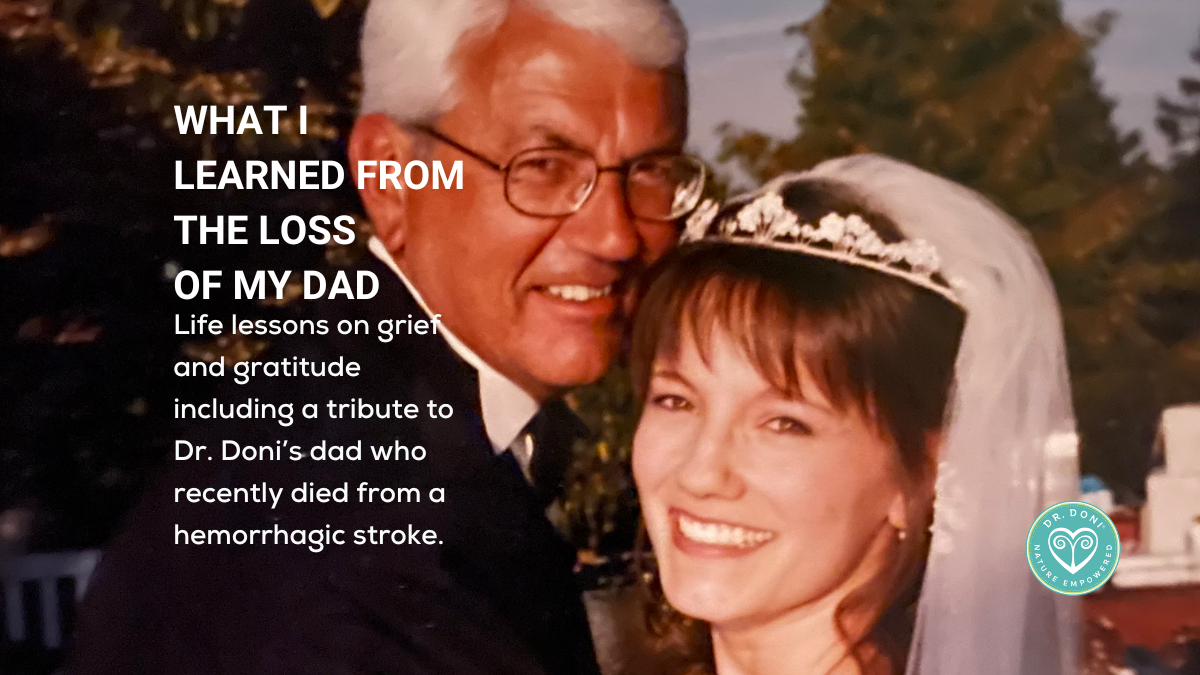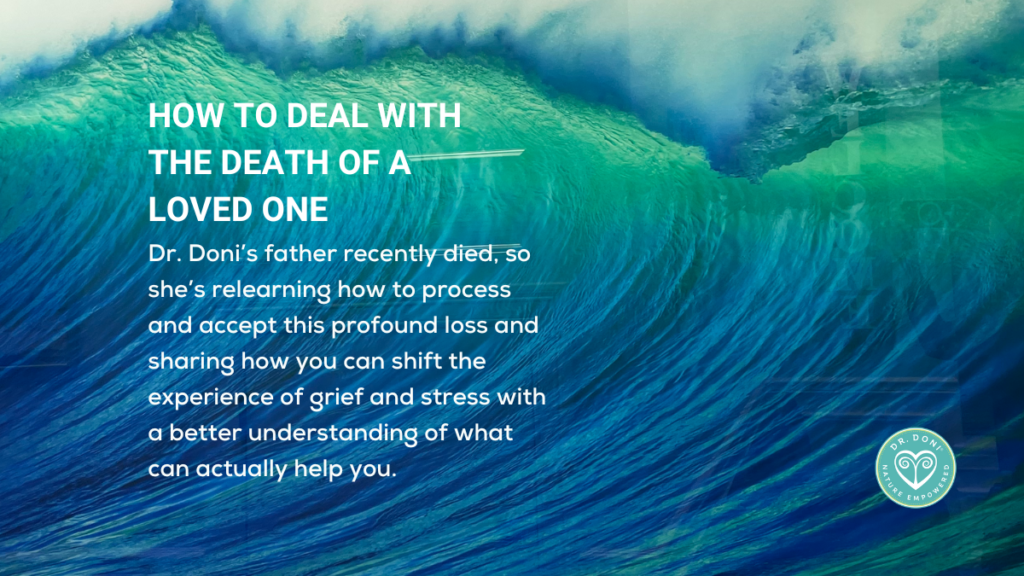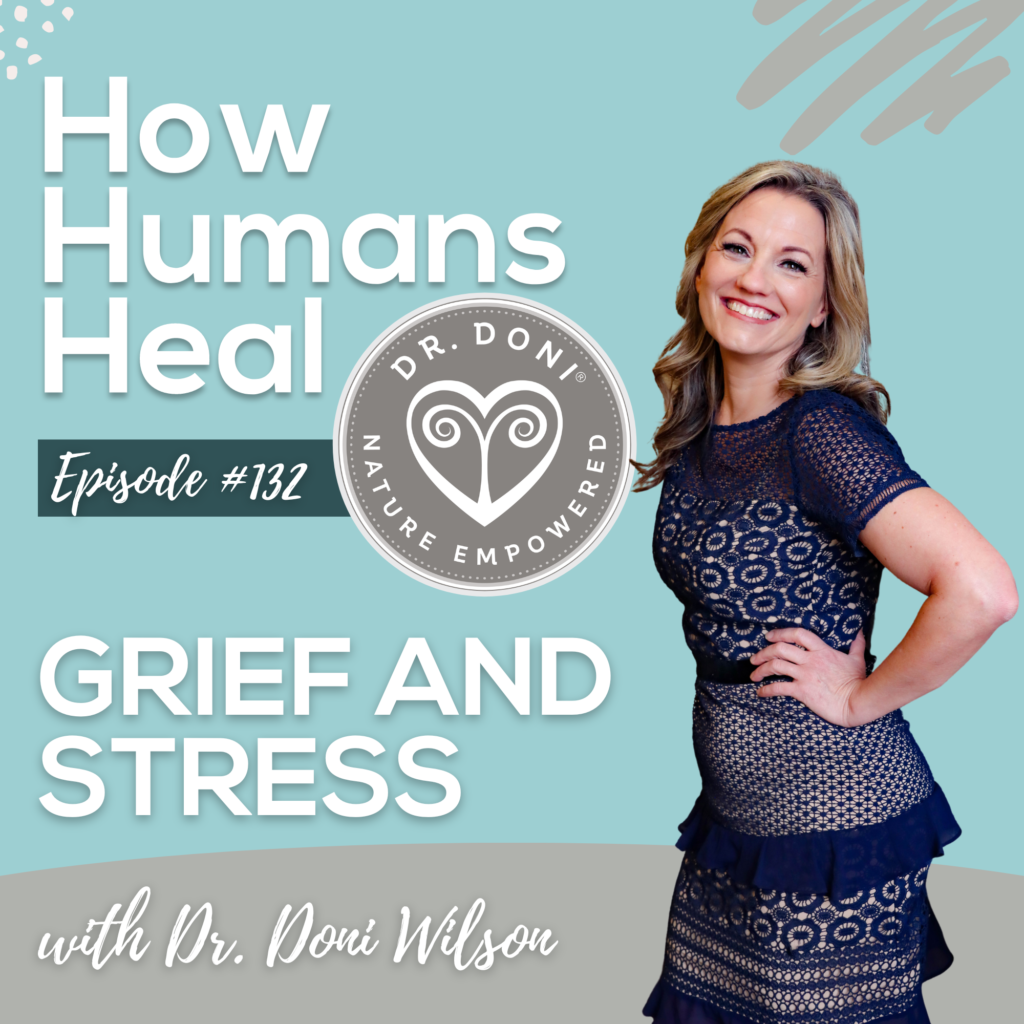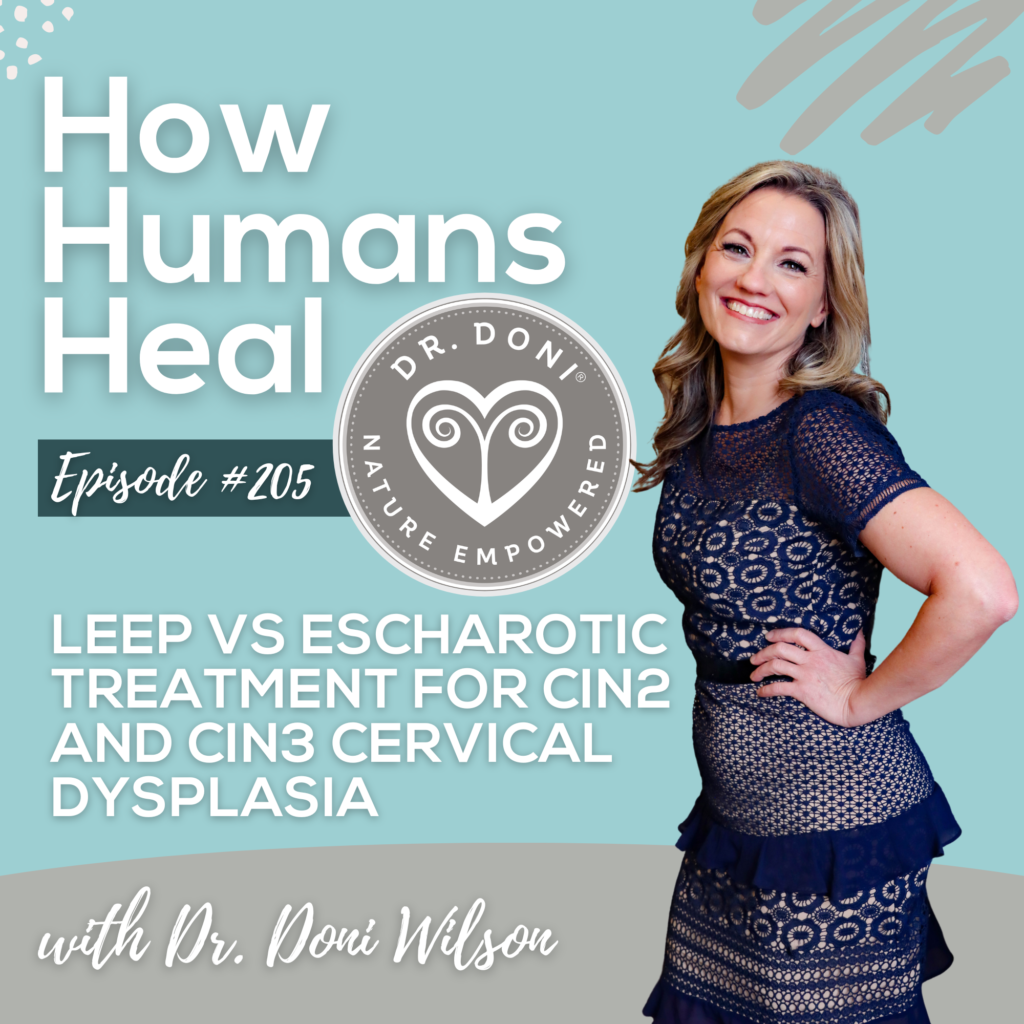
What I Learned from the Loss of My Dad
- Home
- Stress & Adrenal Fatigue
- What I Learned from the Loss of My Dad

“I’m sorry I upset you.” That is – it turns out – the last thing I said to my dad before he died.
Rewind six months… my father experienced a hemorrhagic stroke a few days before my book was released earlier this year. The stroke caused him to lose his memory, ability to communicate, and ability to complete daily functioning. He started over from scratch.
I traveled back and forth to his rehab clinic over the three weeks he was there relearning to walk, talk, and make decisions. Then we brought him home, to his home, and helped him become acquainted again with what he had created for himself before the stroke.
We celebrated my dad’s 80th birthday. We helped him drive again, went to a movie, and observed him getting up each day to head out the door to physical and speech therapy so that he could learn how to do what he loves again.
One week before he died, he drove his antique Porsche to a car show in a monsoon, when that car had not been allowed to be driven in the rain for over 30 years.
Two days before he died, I called him to talk through the steps he was going to need to for a trip he had been planning for months, to go camping in Oregon with his lifelong friends.
My dad couldn’t go the prior year, due to the pandemic. And this year, he wasn’t going to miss it for the world.
My dad was preparing every day with speech therapy, and by carefully placing every item on his packing inventory list into his bags. He was telling everyone how excited he was to go.
He woke up early, drove himself to the Tucson airport, parked, went through security and onto the flight. When he landed in Seattle, he needed to change gates to board his next flight to Portland, Oregon where his friend would pick him up and they would begin their long-awaited time together at Eagle Cap, Oregon.
At some point, as he traversed the Seattle airport, a bleed started in his brain. He lost consciousness and fell in the airport train. A woman found my mom’s phone number in his bag and called her. He was then taken by emergency services to the nearest hospital.
My mom sent me a text, which I received about 20 minutes later. He was already at the hospital, and we were awaiting the CT results. The results confirmed it. My dad had another hemorrhage, this time so large he would not be able to survive it.
Did the doctor just say that?
Were they sure there is nothing else they can do? He just recovered from a hemorrhagic stroke – can he not make it through this one? Could he possibly have the wherewithal to go through what he just came through, again?
My mom rushed to pack as we found the soonest flight for her to go to Seattle. Now it was getting late in the day, so the next flight was at 7 am from Phoenix. How would she get there? I called several car services – all full. I called my cousin who lives nearby – without a hesitation, he said “we’ll pick her up at 3 am.”
My mom, after having recovered from a stroke herself just two years ago, hoped with all the hope she could muster, that he would recover again. My sister made sure mom was picked up from the Seattle airport and ushered to the hospital where her longtime friend joined her.
She was in complete shock after having just said goodbye to my father as he headed out on his camping trip, and now he was intubated on every possible machine to keep him alive long enough for her to arrive at the hospital.

The doctor led her into a private room, and I was on the phone listening as the doctor explained that the brain bleed, my dad experienced was “unsurvivable.” That is what he called it.
There was no doubt in his words or message. There was no hope of him coming through this. All that he had recovered in the past six months was gone. All that my mom had known of him, after being married to him for the past 54 years, was over.
And then the doctor asked me if I wanted them to try to keep him alive long enough for me to get there. It was one of the hardest decisions I’ve ever had to make, and at the same time, I knew immediately… I did not want to delay his process.
I knew that he knew how I felt. I had just said to him, “I’m sorry I upset you,” and he said, “It’s okay, don’t worry, it’s not a big deal.”
It was more important for me to be available by phone, which I couldn’t do if I was on a plane – to help my mom, to make phone calls, to connect with people who would want to say goodbye to my dad.
They say that people in a coma can still hear. So, we put our phones on speaker. My mom (in the room with my dad), my sister in South Korea, my daughter (in Manhattan), and me (at the time I was in Spain), and we held a farewell ceremony for my dad.
We each shared our thoughts and words on love and encouragement with him. We reminded him of how grateful we are of him and all the opportunities he gave us, for all the fun times he created for us, and about how amazing he is for recovering from the first stroke and heading out on this camping trip.
We cried, and we laughed, and we felt as though we were all together once more.
Then we called his sister, his nephew, cousins, and his camping buddies. They were all able to have a final “conversation” with him and share their love and appreciation for him in their lives.
Each one of them knew what he would have wanted to say back to them – “I’m sorry I can’t be there with you. I want to be there with you more than anything.”
Lessons from My Father
My dad never gave up easily on anything. He worked for the same company his entire career, since he graduated from pharmacy school, until the company had grown to such high achievement that it was purchased by a larger company.
He kept his 1968 Porsche as the first and only owner, through 20 moves to different homes around the West Coast and Minnesota. And he kept his same camping buddies in their favorite wildness area since his childhood.
My dad taught me what consistency looks like, even amidst great change. He taught me diligence, loyalty, perseverance, commitment to excellence, and the ability to get back up when you fall, and I couldn’t be more grateful.
I fell once, literally down a rock pathway on the side of treacherous mountain in a rainstorm in Washington State. At age 8, my dad had me hiking in the Cascades and nearby mountain ranges. He helped me up and we found a secure spot to wait out the storm.
While sometimes it seemed extreme, and felt like more than I could handle, looking back I see that he showed me that I am stronger than I think, braver than I thought, and my powerful than I imagined.

After all those years of my childhood spending time outdoors – hiking, skiing, bicycling, boating, and camping – it is no wonder I have an intense love of nature.
He also taught me that what is most important is to feed ourselves and take nutrients that can help prevent health issues and the need for medications. This coming from a pharmacist who ran a successful chain of 1200 pharmacies.
Our house was filled with samples from pharmaceutical companies and yet, when I caught a cold, I was given a cup of tea and warm blanket. I only took antibiotics once in my childhood.
So, it really should not have been a surprise to my parents when I called on the first day of pharmacy school and told them, “I’m not going to pharmacy school. I’m going to become a naturopathic doctor.”
My dad was very upset with me about that decision and made it clear that I was going to have to be responsible for that choice, on my own. I paid for my own education and worked to support myself through naturopathic medical school.
It was years later that my dad started asking me for health advice. I feel so proud to have helped him recover from a severe flare of Crohn’s disease when he was 75. And since then, he followed a daily regimen of supplements I recommended for him. He placed an order for refills just two weeks before he died.
Still, that was not enough to save his life.
It is not known why he had the stroke. He didn’t have high blood pressure. He didn’t have a clot. His blood was not too thin. Why did his blood vessel break that day at the Seattle airport?
We will never know for sure. It could have been a side effect of the medication he took to manage Crohn’s disease – stroke is a known side effect. It could have been that his blood vessel simply gave out. Or it could have been a side effect of a vaccine, or perhaps related to the flight, a very rare occurrence according to studies.
Whatever it was that caused the brain bleed that killed my father, what I know is that he would rather leave this life with a sudden incident doing what he loves, and that is how it happened.
So, it is just as it was meant to be. My dad on his way to spend time in the wilderness… the forever wilderness, where he found peace.

Connect with Dr. Doni:
- Facebook https://facebook.com/drdoniwilson
- Instagram https://instagram.com/drdoniwilson
- YouTube https://youtube.com/DoniWilsonND
- Newsletter: https://doctordoni.com/www (Weekly Wellness Wisdom)
- Podcast: https://doctordoni.com/podcast (How Humans Heal)
More Resources from Dr. Doni:
- Stress Type Quiz: Assess your adrenal function
https://doctordoni.com/quiz - Dr. Doni’s Book: Master Your Stress, Reset Your Health
https://doctordoni.com/book - Dr. Doni’s Facebook Group: Stress Warrior Stress Resiliency
https://facebook.com/groups/stresswarrior - HPV Recovery Guide (FREE)
https://doctordoni.com/ddpp/hpv-guide/ - FREE Masterclasses with Dr. Doni
https://doctordoni.com/masterclasses - FREE Guides from Dr. Doni
https://doctordoni.com/guides
Personalized Solutions:
- 14-Day Detox Program: You can start this transformation program anytime
https://doctordoni.com/detox-program - Say Goodbye to HPV (12-week Program): Begin the journey to freedom from HPV today!
https://doctordoni.com/hpv-12-week - If you’d like to meet with Dr. Doni one-on-one for your health, request a Health Breakthrough Session: https://doctordoni.com/breakthrough
Disclaimer: This specific article and all other Content, Products, and Services of this Website are NOT intended as, and must not be understood or construed as, medical care or advice, naturopathic medical care or advice, the practice of medicine, or the practice of counseling care, nor can it be understood or construed as providing any form of medical diagnosis, treatment, cure, or prevention of any disease.
3rd Nov 2022
P.S. I published an additional blog post and a podcast episode this week about grief and loss:
- BLOG: How to Deal with the Death of a Loved One: Shifting the experience of loss, grief, and the associated stress with a better understanding of self-care.
- POD: Grief and Stress with Dr. Doni (Episode 132): Steps you can take to prevent health issues associated with grief.
Share this Post:
Dr. Doni Wilson
14 Day Detox Program
Take the Stress Type Quiz
Dr. Doni Social Media
Popular Posts


The 5 Burnout Types

Healing HPV Holistically: Dr. Doni on the Inspire Health by Jen Podcast

Recent Podcasts
Signup to receive our weekly newsletter with all the latest news, podcasts and special offers
New Book - Order Today!

SIMPLE PRACTICES for SHIFTING FROM YOUR STATE of STRESS to YOUR FLOW and FREEDOM
MASTER YOUR STRESS
RESET YOUR HEALTH
Order Now! Related Posts

What is making you susceptible to HPV?
I have been working with women who had abnormal cells on their cervix and/or vaginally, caused by HPV for over 20 years now. And while

The 5 Burnout Types
Did you know there are 5 burnout types? They are based on your Stress Type®, which is how your adrenal function has been affected by

Healing HPV Holistically: Dr. Doni on the Inspire Health by Jen Podcast
Dr. Doni was interviewed by Jen Ciszewski on the Inspire Health by Jen Podcast, talking about how to heal away HPV from your body for good.

Stress and Trauma: The Science Behind It, How It Shows Up and How to Heal: Dr. Doni on The Burn Fat and FEAST Podcast
Dr. Doni was interviewed by Sarah B. Thomas on the Burn Fat and FEAST Podcast, talking about the impact of stress and trauma on our health and what to do to recover from them.















